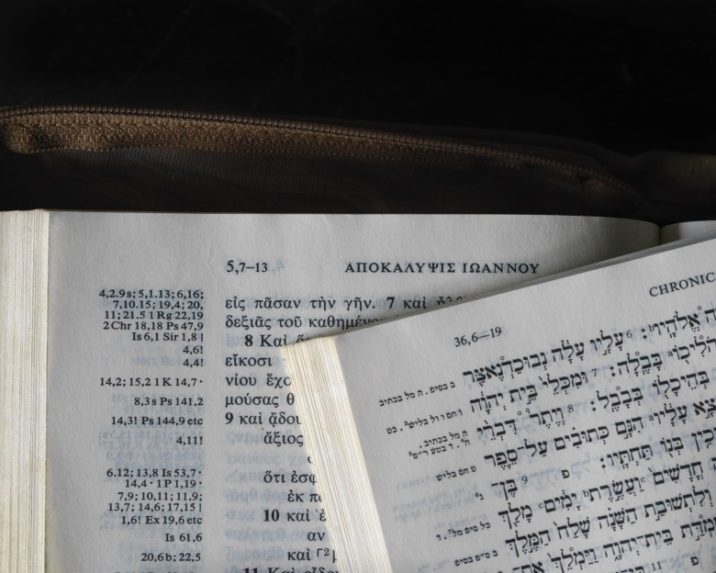by Andrew M. King, PhD
Dr. Tavis Bohlinger penned a very thoughtful response to my recent FTC article on first-year language students leaving their Greek and Hebrew Bibles at home during corporate worship. I heartily commend it to you. Thanks to Dr. Bohlinger, and others, for taking the time to read and engage! I have been encouraged by many who voiced their desire to magnify Christ and serve the Church using the biblical languages. With a grateful heart, I offer a few final reflections on the issue.
First, though it was read this way by some, my post was never intended to be an injunction according to the law of the Medes and the Persians. Nor was it my intention to accuse anyone specific of arrogance (it was geared towards first-year language students, after all). I recognize that many folks who bring their “good-OL Bibles” to church do so with clean hands and a pure heart. I praise God for the many who, as Dr. Bohlinger exhorts, “bring their football everywhere” with a desire to be immersed in God’s Word. I have been filled with joy to see the responses of brothers and sisters resolved to plumb the depths of the Scripture in Greek and Hebrew. So, I promise not to fire up the furnace if I see you (in real life) with your GNT or BHS in gathered worship (no guarantees for you LXX-carrying types).
Second, I very much appreciate the five practical steps Dr. Bohlinger outlines in his second point. For those committed to bring a print copy OL text to church, this is a wonderful model for how to do it well!
Third, while I affirm that many act in goodwill, some responses have been telling. In an age of social media, where appearances often trump substance, things like theological jargon and the biblical languages can sometimes become a Shibboleth for those “in the know.” One individual, for instance, who said he carries his GNT every week let me know that while I am a prideful fellow, he himself has no such struggle. While I am 100% confident he is correct about the first part, I would invite all of us (not I, but the Lord) regularly to consider how we can become like children as we seek greatness in the kingdom of heaven. Again, Dr. Bohlinger’s post addresses this well. OL Bible or not, we must all examine ourselves, so that no advantage may be gained over us by Satan: for we are not ignorant of his devices (2 Cor 2:11).
Fourth, I understand that everyone’s context is different. You may live in a place where it is normal to worship with believers from many nations, and tribes, and tongues. What is it to add one more language in corporate worship? No argument from me here! My concern is for those of us who are not in this situation. For example, I lived in the southern United States for many years, attending a “seminary church” for over a decade. Anecdotally, I have seen the divide among the “regular Christians” and the perceived “Christian elites” in the body. At least in my context, OL Bibles were a part of this equation. This may not be a problem where you live, and, if not, praise the Lord! Yet, I still believe it is a good practice for those of us in biblical studies to ask whether we are being an encouragement or an obstacle to our fellow believers pursuit of Christ. This leads to my final point.
Fifth, among other things, I am always conscious of new/growing believers in our midst. We have had some new Christians join our church recently. They expressed their intimidation because everyone “already knows more about this God and church thing” than they do. They confessed feeling like they may never be “serious Christians” like those of us connected to the seminary. They didn’t know what ecclesiology or soteriology meant when they were mentioned casually in a group setting, and they were too embarrassed to ask. Folks like this are always in my mind as I gather with the Saints. This shapes the kind of conversations I have at church, even when talking to my students and colleagues. I view this as a discipleship issue. I want believers like our new friends to know that that they can open the English Study Bible they just purchased at the bookstore and meet with the Living God. Of course, over time I trust they will grow in Bible literacy and Christian maturity. The question I ask is whether my presence in corporate worship invites this relationship or inhibits and intimidates. By God’s grace, we will see more new believers of this sort as we bear witness to Christ in our communities.
Does this mean we water down doctrine? Does this mean that we cater our worship solely to what others think or feel? μὴ γένοιτο! But I do believe being mindful of newer believers is a sweet means of grace to those who are growing in the faith. I was encouraged to hear many who share this sentiment by using a mobile device or a plain-appearance OL Bible in corporate worship. Personally, I bring my iPad with me everywhere, outfitted with Accordance, so if I did want to check something after the service, I could turn the backlight down low and take a peek without drawing attention. I was refreshed by the tender and pastoral heart expressed in many responses to my article. May their tribe increase.
In conclusion, I am grateful for the interaction and dialogue. As a language prof, I am more hopeful than ever for the future (not to mention job security!). If you are doing justice, loving mercy, and walking humbly with our Triune God, together with your local church, I consider it an honor to call you brother or sister. Let us continue to exalt our Lord, as his Word continues to be a lamp to our feet and a light to our path.
Andrew M. King (Ph.D., Southern Seminary) serves Assistant Professor of Biblical Studies at Midwestern Baptist Theological Seminary and Spurgeon College. He is the author of Social Identity and the Book of Amos (T & T Clark, forthcoming). He also serves as the Book Review Editor of the Journal for the Evangelical Study of the Old Testament. Andrew lives in Kansas City with his wife Lauren and their four children (Naomi, Benaiah, Ezra, Judah). He is a member of Emmaus Church. You can follow him on Twitter @aking443 or his Facebook page.





